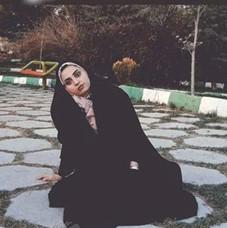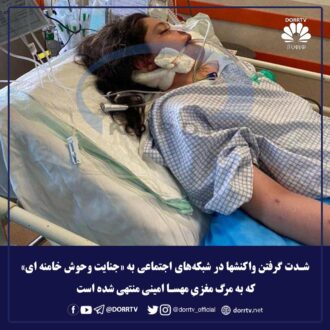Iranwire – When 22-year-old Mahsa Amini died in the custody of morality police on September 16 it united Iranians, especially women – who are oppressed each day more than the day before – under the slogan “Woman, Life, Freedom”. People took to the streets the length and breadth of Iran to demand women’s rights and freedom. Even so, the patriarchal society continues to claim victims.
Below are the stories of five woman who are among the most recent victims of the patriarchy’s “honor killings” and suicides out of desperation.
***
Sahar: A woman longing for freedom
Her profile on Instagram was a black circle with the word “Silent” at its center. Below that, where users generally write a sentence about themselves, she wrote, “Sometimes death is the only cure.”
This was a corner of the dark world where Sahar Latifi lived, a young woman of 23 who, according to people close to her, was a “victim of religious fanaticism and patriarchy”.

Sahar, the mother of a four-year-old girl who lived in the city of Asad Abad in Hamedan province, committed suicide on December 14 by taking aluminum phosphide tablets.
“Sahar grew up in a large family,” a person close to her told IranWire. “She had nine brothers and three sisters. Some of them were the children of her stepmother because Sahar’s mother died and her father remarried. A few years ago the family forced her to marry a seminary student who has now completed his studies and is a cleric. Her husband had a very misogynistic mind and throughout their married life he treated Sahar violently. She had very little support and, unfortunately, decided to end her life.”
According to this source, Sahar’s husband held classes on religion and taught “anthropology and Quranic sciences” at the seminary as well: “He was a fanatic and extremist. Many times I witnessed him beating and tormenting Sahar. She wanted to divorce him but her siblings, who were not very enlightened, gave her no support and believed that divorce was a dishonor. Sahar was really defenseless. Several times in gatherings she openly talked about suicide and said she couldn’t tolerate this life.”
Husband tried to hide her body
After the death of Mahsa Amini Sahar supported the “Woman, Life, Freedom” movement: “After Mahsa Amini was killed, Sahar, who had suffered a lot because she had been denied any freedom, supported the movement and was beaten by her husband for it. She used to say, ‘I hope the women of this land some day witness the dawn of freedom and justice.’”
But Sahar did not live long enough to witness that. According to IranWire’s source, her fanatical husband considered women “worthless creatures whose only function was to cook and serve their husbands.”
“On December 14 Sahar and her husband had once again quarreled in front of their little daughter and he had punched and kicked Sahar,” the source said. “After her husband left home she entrusted her daughter to a friend and said she was going to the market and would be back. She went to a shop and bought aluminum phosphide tablets. Then she went to the shrine of Imamzadeh Abdollah and took the pill right there. When people noticed she was feeling sick they took her to the hospital. Sahar was full of hope and aspirations. When she was taken to the hospital she regretted what she had done and said ‘I don’t want to die,’ but, sadly, she did.”
The coroner confirmed that Sahar had committed suicide by taking pills. As her family was washing her body according to Islamic funeral ritual they saw bruises and marks of beatings on her body and her stepmother was able to prove that Sahar had committed suicide because of her husband’s treatment of her, but no action was taken against him because he was a member of the clergy and had immunity.
“The day they wanted to wash Sahar’s body, they would not allow us to see her no matter what we did,” the source said. “Her husband and a few chador-clad women went inside and closed the door, but somehow her stepmother, a few others and I went inside. I saw with my own eyes injuries and marks of beatings on her face and body.”
Zeinab: Victim of forced marriage
On December 18 the Human Rights Activists News Agency (HRANA) reported the suicide of a 15-year-old girl in the village of Abu Homeyzeh in Khuzestan province.
“Zeinab was under pressure to marry her cousin because tradition dictates that a girl can only marry her cousin,” an informed source told IranWire. “She was unwilling to do so and, the day before her suicide, his father and brothers beat her. Then, when nobody was around at home, she hanged herself.”
Suicides by women because of violence by men, pressure to accept a forced marriage or the husband’s refusal to grant a divorce are common in Iran. According to a study, between November 2021 and November 2022, in Kurdistan province alone 104 women attempted suicide and 96 of them died. The study cites firstly family disagreements and then poverty as the most common reasons for these suicides.
Women’s rights activists believe that now, with a movement that gets its power from the motto “Woman, Life, Freedom,” it is time to revisit more deeply concepts such as “chastity” (of women) and “honor” because these words are the daggers that are used to murder women.
Tuffaheh: Killed by her father after being raped
On the evening of December 2 the media published a picture of the body of a girl covered with blood and wrapped in a blanket that was abandoned in a street in a neighborhood of Ahvaz, the capital of Khuzestan province.
Early reports said she was 17 and a child bride who was murdered by her father to protect the family’s “honor” after he heard rumors that she had “betrayed” her husband.
A few days later, however, Hoda Karimi Sadr, an ethnic Arab women’s rights activist in Khuzestan, revealed more details about the murder. The girl’s name was Tuffaheh and she was only 12 years old.
“Tuffaheh was 12 and had no ID,” she said. “Her father is a crystal meth addict who pays for his addiction and other expenses by theft. According to a person close to Tuffaheh, one day when her father was hallucinating under the influence of crystal meth, he imagined that his daughter was a chicken and wanted to cut off her head. After this the family sent her to the home of her aunt in the town of Hamidiyeh, but Tuffaheh returned home after a while. After her parents divorced, Tuffaheh became homeless. It is not true that she was a child bride. When she was roaming the streets she was raped by a man her father’s age and was later taken to the Welfare Organization. Her grandmother signed a pledge to support her and took her from there. When her father learned about the rape, he killed his daughter and left her body in front of the home of the rapist.”
Karimi Sadr criticizes the distortion of the news of about Tuffaheh’s murder and believes that it was due to negligence of civil institutions and organizations such as the Welfare Organization that handed Tuffaheh over to her family despite the fact that they knew her father was not a proper guardian.”
Katayoun and Zahra: Murdered by their husbands
On December 3, only a day after the murder of Tuffaheh, Katayoun Aminian was stabbed 17 times by her ex-husband in Sanandaj, the capital of Kurdistan Province, and died. While they were married, Katayoun had repeatedly gone to medical officials as a result of injuries inflicted on her by her husband. After many years of suffering from violence, she finally got a divorce, but her husband never acknowledged it. He incessantly asked her to come back to him. According to a person close to Katayoun, he repeatedly told her: “You are my honor and I am sorry that I divorced you. Come back to our life together.”
According to this source, “On their wedding anniversary Katayoun’s ex-husband took three knives, symbolizing himself and their two children, went to her and stabbed her 17 times for the 17 years that they had lived together.”
Our fifth victim who was also murdered recently is Zahra Rezvani, a native of Chaharmahal and Bakhtiari province. According to people close to her, Zahra had been accepted by a university to study and become a midwife, but her husband, who was nearly 20 years older than her, was against this so he simply suffocated her with a scarf and then burned the marks left by the scarf on her neck.
 Shabtabnews In this dark night, I have lost my way – Arise from a corner, oh you the star of guidance.
Shabtabnews In this dark night, I have lost my way – Arise from a corner, oh you the star of guidance.



